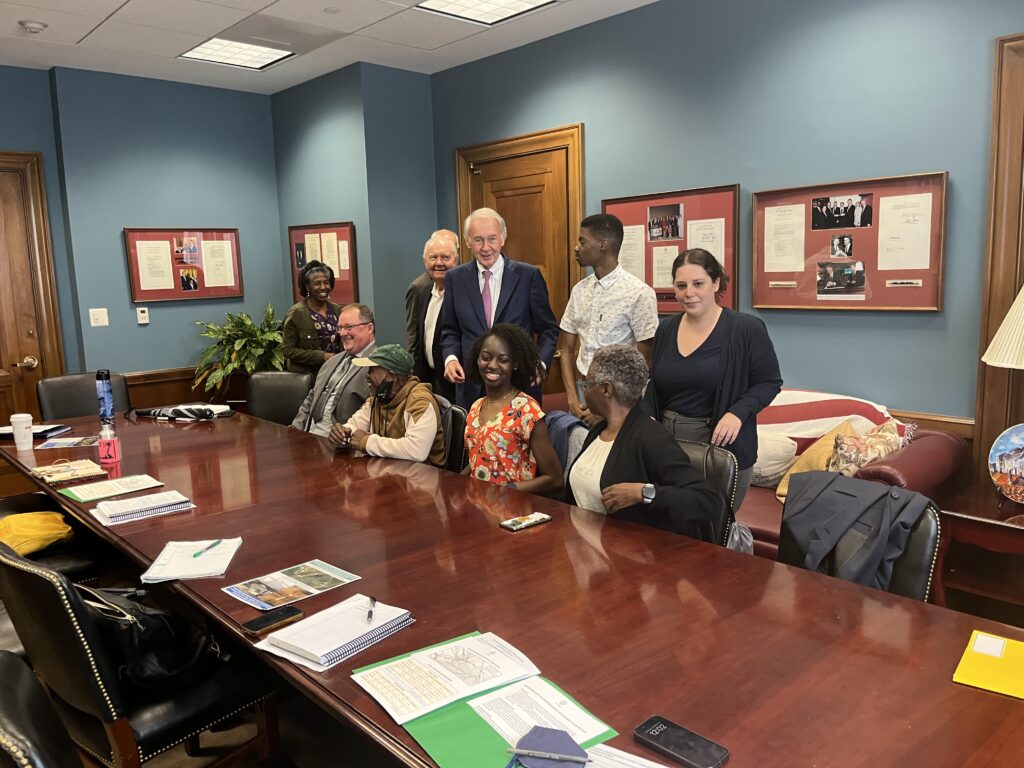|
Getting your Trinity Audio player ready...
|
Since 2019, Earthworks has stood alongside residents, elected officials, lawyers, scientists, and policy makers to raise our voices against a proposal to build what could be the largest offshore oil export terminal in the U.S.: Texas GulfLink.
Now, the EPA has until Oct. 28 to decide if they will uphold their commitments to stand against environmental racism and combat the climate crisis by opposing the licensing of Texas GulfLink, marking a pivotal moment in this grassroots campaign to stop another new fossil fuel project on the Texas Coast from being built.
The purpose of Texas GulfLink is to pump 1 million barrels of crude oil every day from the Houston market to a gigantic structure in the Gulf of Mexico. There, supertankers would be loaded and the oil would be exported for other countries to burn. The project would be historically massive, involving the construction of two onshore and offshore pipelines, a tank farm in the Village of Jones Creek. It would also increase drilling and fracking in the Permian Basin, which is the world’s largest source of climate pollution.
Residents of Freeport and the surrounding areas are already forced to bear one of the most environmentally unjust pollution burdens in the nation on criteria ranging from air toxics, to ozone pollution, to hazardous waste releases. This coastal community would receive zero benefit from the massive new project. The global climate would suffer as well: experts calculate GulfLink would be responsible for well over 100 million tons per year of upstream and downstream greenhouse gas emissions, contributing substantially to already severe climate change impacts.
In September, as Brazoria County grappled with the aftermath of Hurricane Beryl, 20 community leaders gathered at Jones Creek Missionary Baptist Church to make verbal comments to MARAD at the project’s final public hearing. The agency failed to set up the federally-required hearing in person, and instead opted for a virtual session where participants were unable to interact with each other, or see the faces of those speaking. Yet, Brazoria County residents showed the power of community and articulated concerns ranging from air toxins and climate pollution to species extinction, oil spills, and flooding risk

Community members gather in person to provide verbal comments about GulfLink during the final public hearing despite it being held online.
In August, more than 20 members of Congress sent a letter to the Maritime Administration, urging the agency to deny the project’s permit and update its approval criteria based on environmental justice, climate, and public health impacts to more accurately determine whether new deepwater oil projects are in the national interest. In September, 12 residents from the Texas Gulf Coast joined national allies in Washington D.C. to visit Congressional offices in-person and encourage them to take a stand against GulfLink. The offices of Senator Ed Markey, Congressman Greg Casar, Congresswoman Nanette Barragán, and Congresswoman Pramila Jayapal were especially receptive to the concerns that were raised, and we look forward to coordinating with them on future efforts to stop new oil export projects from being built.

Senator Ed Markey meets with residents of the Texas Gulf Coast to discuss how new and expanding fossil fuel export projects are not in the public interest.
Most recently, advocates submitted a petition with more than 6,000 signatures to Dr. Earthea Nance, EPA Region 6 Administrator, demanding she deny the project’s deepwater port license. The petition follows a letter sent to Governor Gregg Abbott from local groups about the need to acknowledge “the health and safety of Gulf Coast families–not to mention the fate of the world’s efforts to combat climate change–are put at risk so that a handful of fossil fuel executives and shareholders can get rich selling American oil and gas to the highest overseas bidder.”
From providing verbal testimony at multiple public hearings, to organizing countless protests, to even getting arrested, Brazoria County communities and their allies have made it clear: new fossil fuel projects are not welcome. If the EPA is truly committed to tackling legacy pollution, increasing community climate resilience, and building long-term community capacity on climate and environmental justice issues, they will influence the federal government to reject the license for the Texas GulfLink project.

